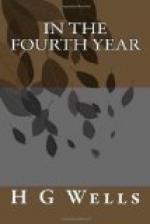After some slight difficulty I ascertained that my representative is a Mr. Burdett Coutts, who was, in the romantic eighties, Mr. Ashmead-Bartlett. And by a convenient accident I find that the other day he moved to reject the Proportional Representation Amendment made by the House of Lords to the Representation of the People Bill, so that I am able to look up the debate in Hansard and study my opinions as he represented them and this question at one and the same time. And, taking little things first, I am proud and happy to discover that the member for me was the only participator in the debate who, in the vulgar and reprehensible phrase, “threw a dead cat,” or, in polite terms, displayed classical learning. My member said, “Timeo Danaos et dona ferentes,” with a rather graceful compliment to the Labour Conference at Nottingham. “I could not help thinking to myself,” said my member, “that at that conference there must have been many men of sufficient classical reading to say to themselves, ‘Timeo Danaos et dona ferentes.’” In which surmise he was quite right. Except perhaps for “Tempus fugit," “verbum sap.,” “Arma virumque,” and “Quis custodiet,” there is no better known relic of antiquity. But my member went a little beyond my ideas when he said: “We are asked to enter upon a method of legislation which can bear no other description than that of law-making in the dark,” because I think it can bear quite a lot of other descriptions. This was, however, the artistic prelude to a large, vague, gloomy dissertation about nothing very definite, a muddling up of the main question with the minor issue of a schedule of constituencies involved in the proposal.




